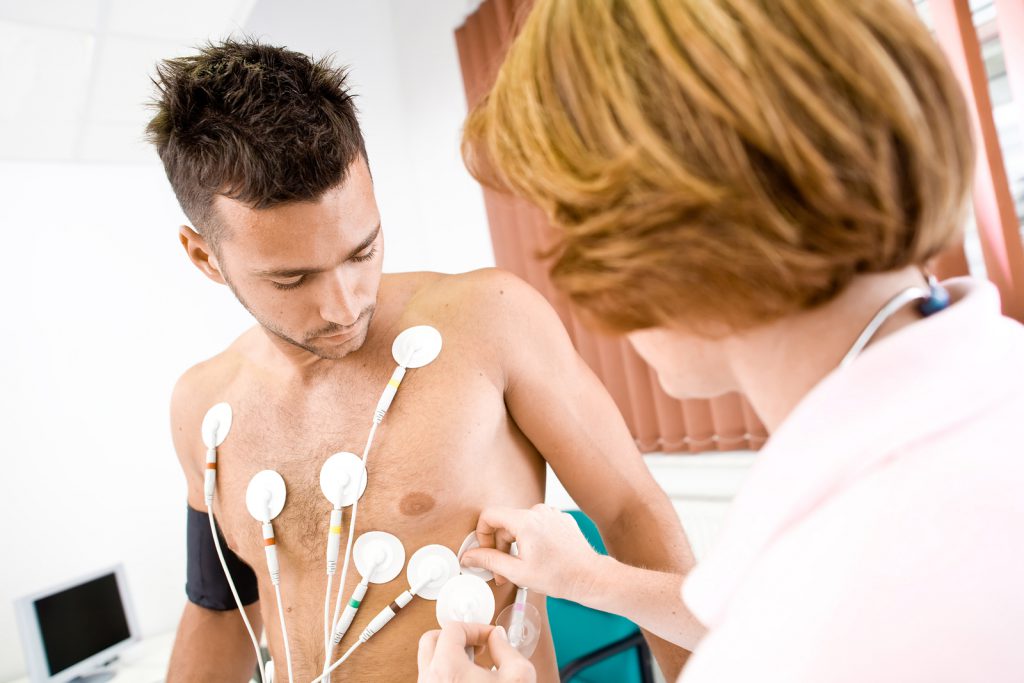Research what it takes to become an EKG technician. Learn about job duties, education requirements, certification and salary to find out if this is the career for you. Schools offering
What Does an EKG Technician do?
Electrocardiograph (EKG) technicians use non-invasive techniques to test for disease and disorders in a patient’s heart and blood vessels. Using EKG equipment, these technicians may monitor a patient’s heart during surgical procedures and various cardiovascular tests, like stress tests. EKG works by recording electrical activity from a patient’s chest, arms and legs, which is associated with heart activity and the movement of blood. Test results are used by doctors in diagnosis of cardiovascular problems like heart disease. Take a look at the following chart for an overview of how to enter this field.
| Degree Required | Associate’s or bachelor’s degree |
| Education Field of Study | Cardiovascular technology |
| Key Responsibilities | Test patient heart and pulmonary systems using electrocardiograph equipment; obtain patient medical history; position patient for tests; maintain equipment |
| Licensure Required | Certification optional, but may be preferred or required by some employers |
| Job Growth (2014-2024 ) | 22% (for all cardiovascular technologists and technicians)* |
| Median Salary (2015) | $54,880 (for all cardiovascular technologists and technicians)* |
Source: *U.S. Bureau of Labor Statistics
What Is an EKG Technician?
Electrocardiographs are instruments that track the heart’s electrical impulses. An EKG technician uses electrocardiograph machines to conduct tests on the heart and pulmonary system in order to diagnose medical conditions. Video screens and electrodes are also used to facilitate the examination. With advanced training, the EKG technician can perform treadmill stress tests, as well as Holter monitoring, which checks the central nervous system and helps diagnose heart disease.
Step 1: Research the Career Duties of an EKG Technician
When performing an EKG, you’ll first obtain the details of the patients’ medical histories. You’ll explain the examination process to patients while positioning them on examination tables and ensuring their comfort. You’ll apply electrodes to the patient’s arms, chest and legs and check their heart rate and blood pressure as the tests are being performed. The test results are then presented to a physician who analyzes them and forms diagnoses. In addition to those duties, you may be responsible for cleaning and maintaining EKG equipment.
Step 2: Earn an Associate of Science in Cardiovascular Technology
You will generally need to attend a technical or community college and earn a minimum of an associate’s degree in cardiovascular technology to become an EKG technician. You can find several accredited programs through the Commission on Accreditation of Allied Health Professionals (CAAHEP). Your coursework should include a mix of classroom, laboratory and clinical instruction in topics such as anatomy and physiology, first aid, principles of electrocardiography, microbiology, medical terminology and pharmacology.
Step 3: Pursue a Bachelor of Science Degree in Cardiopulmonary Science
By continuing your education and earning a Bachelor of Science in Cardiopulmonary Science, you may improve your job prospects and potential salary. In some cases, your credits from an associate’s degree program may be transferable to a bachelor’s program at a 4-year university. Program curricula might include courses in advanced pulmonary pathophysiology, cardiac electrophysiology principles, pulmonary diagnostic testing and patient assessment. A bachelor’s degree program may also offer advanced training in Holter monitoring, stress testing or cardiac catheterization, and may include more involved clinical experience.
Step 4: Become Credentialed
Various voluntary credentials are available like the one through the American Registry of Diagnostic Medical Sonographers (ARDMS), which offers the Registered Diagnostic Cardiac Sonographer (RDCS) credential. The Cardiovascular Credentialing International (CCI) grants the Electrophysiology Registered Cardiac Electrophysiology Specialist (RCES) credential, which is another option. To qualify for these and other credentials, you must graduate from an approved program and successfully pass the credentialing examinations. Other requirements may apply, so you should check with the organizations.
Step 5: Advance Your Career
As your career unfolds and you gain experience, you may want to advance into other professional areas. One of your options includes performing research. You could also take on managerial positions, or enhance your advancement opportunities by acquiring more than one credential.
What Are Some Related Alternative Careers?
Medical laboratory technologists may also aid in the study and diagnosis of various cardiovascular conditions. Though, rather than conducting non-invasive tests, they conduct tests of fluid samples, such as blood. Radiographers use radiologic imaging equipment to create diagnostic images for physicians to use when making diagnoses. Similarly, nuclear medicine technologists use imaging equipment and radioactive drugs to identify problematic growths in the human body.
To continue researching, browse degree options below for course curriculum, prerequisites and financial aid information. Or, learn more about the subject by reading the related articles below:

